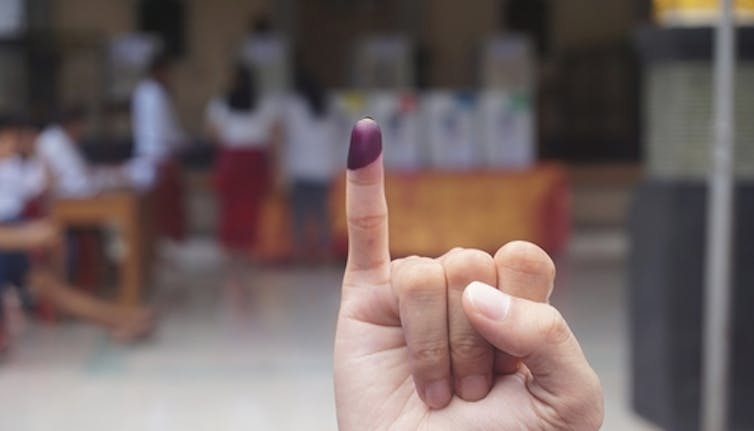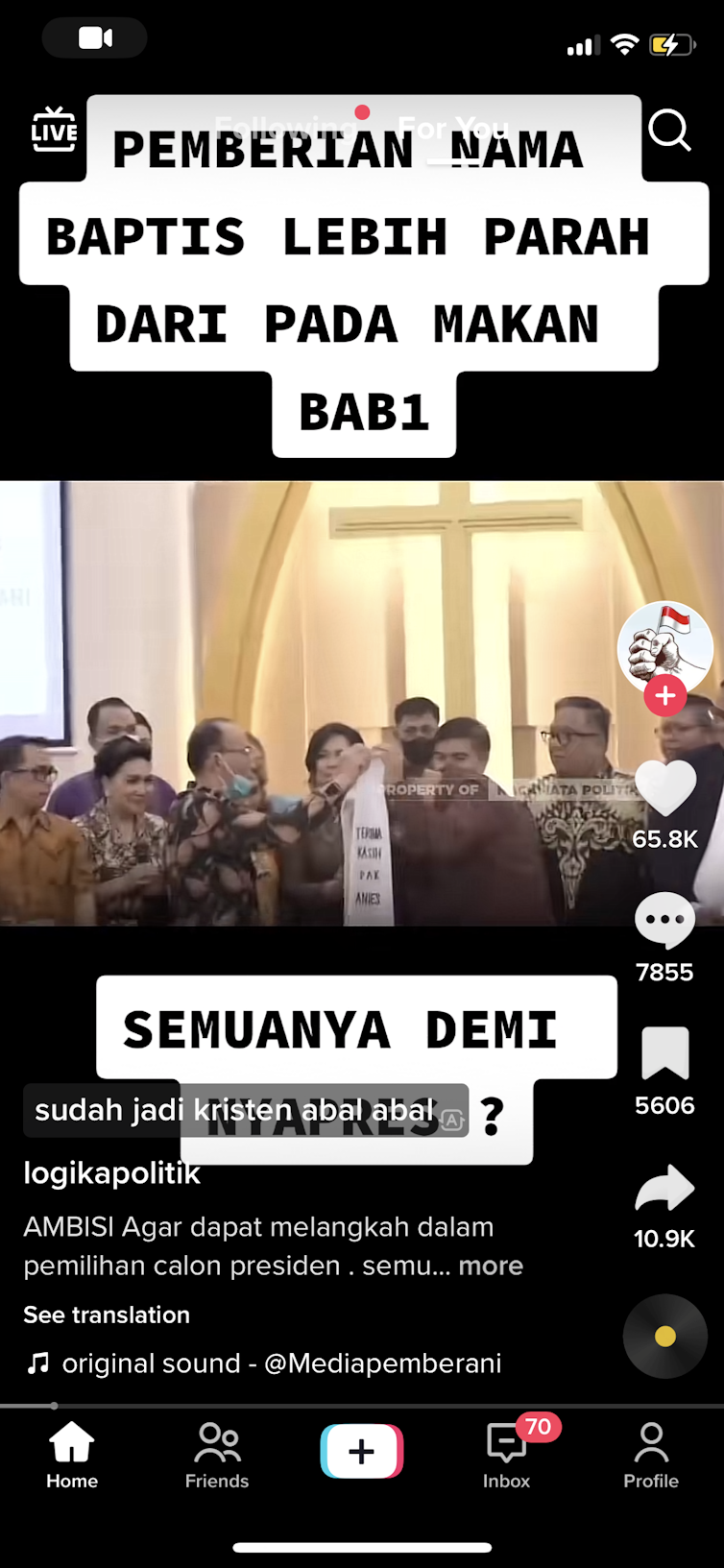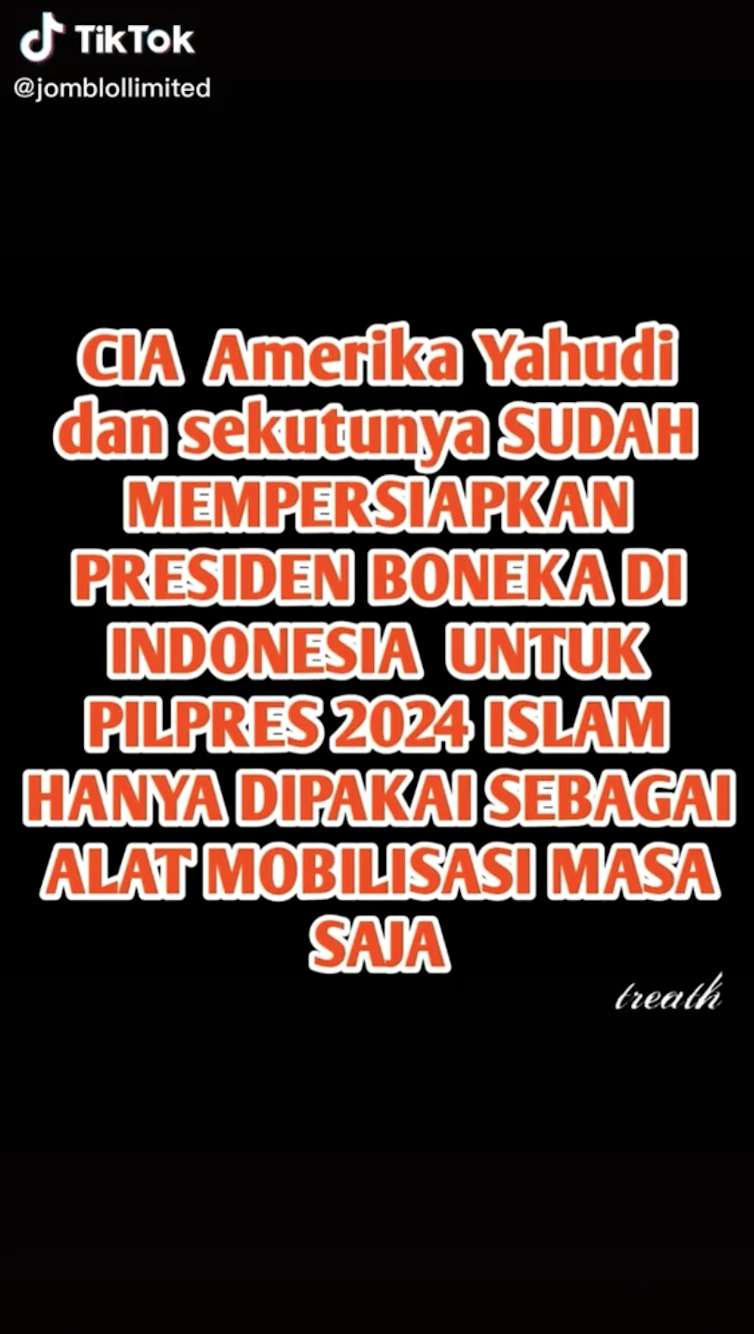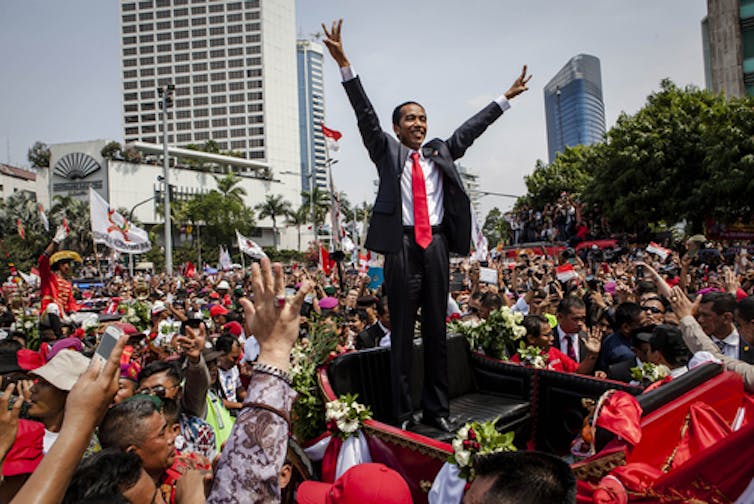
Researchers and civil society organisations must start to study TikTok’s potential impact on Indonesia as the country will hold its general and presidential elections in February 2024.
Indonesia is home to the platform’s second-largest audience globally
Research has also found TikTok has a role in facilitating the spread of hate speech as well as misinformation and disinformation.
So it is imperative to scrutinise its potential impact on Indonesian public opinion. And the public must also pressure TikTok to boost monitoring of what is said on the platform.

Ethnoreligious propaganda on TikTok
TikTok has experienced remarkable growth and gained immense popularity, especially among younger audiences in Southeast Asia, underlining its significant effects on public opinion and behaviours.
This was clearly demonstrated during protests against the 2020 Indonesia Omnibus Law on Labour, when young Indonesians effectively utilised the app to disseminate political messages and rally support.
In Indonesia, a multicultural country with a multitude of ethnic and religious communities, the rise of ethnoreligious hate speech as well as misinformation and disinformation in the digital realm has emerged as a pressing issue.
Ethnoreligious propaganda, including hate speech, misinformation and disinformation, is undeniably widespread across various social media platforms.
But TikTok’s distinct features and expanding influence in Indonesia make it particularly noteworthy.
TikTok’s short-form video format presents different challenges compared to traditional text-based platforms.
The limited duration of videos makes it difficult to provide context and fact-checking for the information presented, making it a fertile ground for hate speech and mis/disinformation to spread.
TikTok also designs algorithms to show users content based on their interests, creating echo chambers that further reinforce existing beliefs and biases.
Without appropriate oversight, TikTok could potentially become a breeding ground for political actors and “cyberarmies.”
Cyberarmies are organised groups of individuals that engage in coordinated cyber activities, often with the goal of influencing public opinion, disrupting online communication, or conducting cyber warfare.
In this case, political actors deploy cyberarmies to disseminate ethnoreligious propaganda, further exacerbating tensions and divisions.
This was apparent during the 2022 Malaysian election, when harmful narratives circulated rapidly on the platform, while TikTok’s intervention proved to be insufficient in curbing their spread.
Political gain and public opinion
My preliminary investigations indicate ethnoreligious propaganda is already circulating ahead of the upcoming elections.
An example of such content is a smear video that targets former Jakarta governor Anies Baswedan, who is a candidate for the forthcoming election.
The video, posted by @logikapolitik on January 12 2023, begins with the inflammatory statement, “giving a baptismal name is worse than eating pork”. The narrator goes on to suggest Anies, who was previously backed by Islamist hardliners, in an attempt to appeal to Christian supporters, “converted” to Christianity after receiving the name Yohanes.

This example exemplifies how political actors can exploit propaganda on TikTok to advance agendas and manipulate public opinion. As of April 6 2023, the video remains on the platform.
We should also anticipate the use of cyberarmies on platforms like TikTok, as has been the case in previous elections.
These individuals often operate through anonymous or fake accounts, enabling them to rapidly propagate and amplify discriminatory messages.
By making these messages appear more popular than they truly are, they can effectively influence public opinion and exacerbate divisions within society.

Real life consequences
Ethnoreligious propaganda on platforms like TikTok can lead to real-life consequences, like increased tensions among diverse ethnic and religious groups.
This was evident during the 2019 Indonesian elections, where a significant rise in hate speech, misinformation and disinformation on social media led to real-life protests and incidents of violence.

Hate speech during the election often took the form of false claims made about opposing candidates and their supporters, aimed at inciting anger and hostility.
These protests turned violent, with clashes between protesters and security forces resulting in several deaths and numerous injuries
To prevent similar situations from arising in the future, it is crucial to address the issue of hate speech and misinformation on TikTok, ensuring that they do not contribute to tensions and violence.
TikTok’s needs to improve its content moderation system ##
As the Indonesian elections approaches, it is vital for TikTok to enhance its content moderation system to limit propaganda on its platform.
To tackle this issue, TikTok must enhance AI and machine learning algorithms with diverse data sets for improved propaganda detection. Additionally, employing more skilled moderators proficient in local languages and norms is vital for handling nuanced content.
To further understand the Indonesian context, TikTok should increase collaboration with local experts, NGOs and academia to gain valuable insights to address hate speech and disinformation challenges.
Lastly, TikTok should be transparent about its moderation efforts, policies, and progress, including publishing transparency reports and engaging in open dialogue with users and stakeholders.
By taking a comprehensive and proactive approach, TikTok can help create a safer and more inclusive online environment during the upcoming Indonesian election.

Nuurrianti Jalli does not work for, consult, own shares in or receive funding from any company or organization that would benefit from this article, and has disclosed no relevant affiliations beyond their academic appointment.
This article was originally published on The Conversation. Read the original article.







